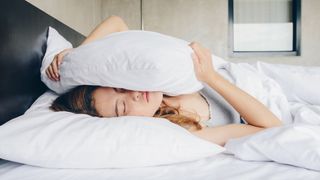A recent survey (opens in new tab) by SleepStandards looked at the sleep habits of over 1,000 Americans (aged 18-79) before and during lockdown and found that:
53% said they now spend less time sleeping than before the pandemic67% say their sleep was healthier before lockdown98% have developed new sleep problems since lockdown68% find it hard to sleep, even with lockdown measures being lifted
Respondents aged 18-22 and 23-38 revealed that during lockdown they are going to bed later than any other age group polled for the survey, putting them at greater risk of developing insomnia - a sleep issue that, according to a report (opens in new tab) by the CDC, is already prevalent among teens aged 13-18. In a recent study (opens in new tab) conducted at the University of Basel, Switzerland, researchers surveyed 435 individuals and found that while people were sleeping longer during stringent lockdown, the quality of their sleep deteriorated. As we know from our feature on why is sleep important (opens in new tab), long-term deprivation is bad news for our health. This was associated with the burden of working from home more, and juggling childcare and financial worries. However, sleep quality was increased when respondents spent more time outdoors, especially when exercising. The study ran online between March 23 and April 26, a time when over 85% of those polled were working from home, and found that 75% of respondents slept up to 50 minutes longer than before lockdown. Lead researcher and psychologist Dr Christine Blume, PhD, states that one factor contributing could be the lack of a daily commute for people now working from home or who have had a job change due to the economic effects of the coronavirus pandemic. The survey also found that quieter social lives, or what the researchers refer to as less ‘social jetlag’, led to sleep-wake patterns being dictated more by innate body clock rhythms and less by ‘social rhythms’ like commutes and enforced office-based work start times. Fitness tracker (opens in new tab) brand Polar also published anonymized sleep data (opens in new tab) from the lockdown period and found that, among Polar device users living in America and Germany, sleep time on weekdays increased by 14 minutes on average in the last two weeks of March compared to January and February. The average bedtime also shifted to 20 minutes later on weekdays, with wake-up times happening on average 34 minutes later.
How to get your sleep habits back on track
If lockdown has affected your sleep routine too, there are ways to get it back on track. When writing about the findings of the University of Basel study, Dr Blume said, “Our findings suggest that physical activity outdoors could counteract a deterioration in sleep quality.” So getting outside once a day could be the first step towards regaining control of your sleep routine and enjoying a better quality of sleep. Other expert-led tips to consider include the following…
- Stick to a regular bedtime and rise routine In a Medium post, Dr Blume also explained how, ‘In several studies (opens in new tab), participants who described their sleep times as more regular, that is, when they were going to bed and getting up at about the same time every day, also reported sleeping better.’ So the message is simple: go to bed and wake up at the same time each day, even on weekends, to help your body get used to your new routine and sleep/wake rhythm until it becomes habit. 2. Exercise early to sleep better at night Dr Michael Mosley, creator of the Fast 800 (opens in new tab) plans says that, “Resistance exercise helps with sleep quality and also improves anxiety and depression, which will in turn help you sleep better. I like to exercise first thing in the morning and it’s worth getting straight out into the early morning light. Your sleep clock is reset every day by bright morning light, which tells your body that the day has begun.” 3. Reserve your bed for sleep According to the Sleep Foundation (opens in new tab), turning your bed into a makeshift office or home movie hub isn’t a great idea for sleep. ‘Sleep experts emphasize the importance of creating an association in your mind between your bed and sleep. For this reason, they recommend that sleep and sex be the only activities that take place in your bed. This means that working-from-home shouldn’t be working-from-bed. It also means avoiding bringing a laptop into bed to watch a movie or series.’ 4. Avoid caffeine in the evenings What you eat and drink throughout the day can also affect your sleep, so try to avoid heavily caffeinated drinks after midday, and keep chocolate (which contains caffeine) to a minimum in the evenings if you are susceptible to the energizing effects of caffeine. When it comes to eating for better sleep, Mental Health.org recommends (opens in new tab), ‘Eating rice, oats and dairy products can produce chemicals that increase our desire to sleep. However, food and drink containing lots of caffeine or sugar can keep you awake, so drinking less tea and coffee and eating less chocolate and other sugary foods late in the day might help you to sleep better.’ If you’re experiencing long-term sleep issues, we’d suggest speaking to your doctor or other relevant healthcare professional. Learning how to relax properly before bed and freeing your mind of any worries can lead to better sleep. The best meditation apps (opens in new tab) can help you relax, and learning how to manage anxiety (opens in new tab) could also pay dividends for a better night’s slumber. Also take a look at what you’re sleeping on, as investing in the best mattress (opens in new tab) or best pillow (opens in new tab) for your favorite sleep style could make a big difference.
